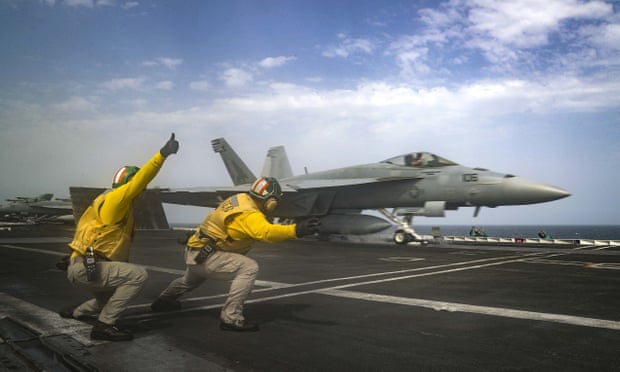IRAN SAYS 'THERE WILL BE NO WAR' AS US WARNS OF RISK TO CIVILIAN AIRCRAFT
Zarif: nobody suffering from ‘hallucination’
of taking on Iran
US: potential for ‘miscalculation or
misidentification’ of planes
Iran’s foreign minister said on Saturday
“there will be no war” with the US, since “nobody in the region is suffering
from a hallucination to think that he is able to confront Iran”.
Nonetheless, US diplomats warned commercial
airliners flying over the Persian Gulf that they faced a risk of being
“misidentified” amid heightened tensions between Washington and Tehran.
The US has ordered bombers and an aircraft
carrier to the Gulf over an unexplained perceived threat, raising tensions a
year after Donald Trump pulled out of the nuclear deal between world powers and
the Islamic Republic.
John Bolton: the man driving the US towards
war … any war
In remarks quoted by the state-run IRNA news
agency at the end of his trip to China, the foreign minister, Mohammed Javad
Zarif, said the Islamic Republic was “not seeking war”, adding: “In fact, as
the supreme leader said, there will be no war since we are not seeking war and
nobody in the region is suffering from a hallucination to think that he is able
to confront Iran.”
He added that though Trump has said he is not
seeking war, “some that have sat around him” are pushing such a conflict.
That appeared to be a reference to national
security adviser, John Bolton, who has long advocated regime change in Tehran.
On Saturday, a warning from the Federal
Aviation Administration (FAA) relayed by US diplomatic posts underlined
increased risks in a region crucial to global air travel and where Lloyd’s of
London has warned of increasing risk to maritime shipping.
The oil giant ExxonMobil has begun evacuating
staff from Basra in Iraq, where the US consulate has been closed for months
following a rocket attack the US blamed on Shia militias backed by Iran, local
authorities said.
Authorities allege that a sabotage operation
targeted four oil tankers off the coast of the United Arab Emirates, and
Iran-aligned rebels in Yemen claimed responsibility for a drone attack on a
crucial Saudi oil pipeline. Saudi Arabia blamed Iran for the drone assault, and
a newspaper linked to the Saudi royal family called on Thursday for America to
launch “surgical strikes” on Tehran.
The order relayed on Saturday by US diplomats
in Kuwait and the UAE came from an FAA Notice to Airmen published late on
Thursday. It said all commercial aircraft flying over the Persian Gulf and the
Gulf of Oman needed to be aware of “heightened military activities and
increased political tension”.
This presents “an increasing inadvertent risk
to US civil aviation operations due to the potential for miscalculation or
misidentification”, the warning said. It also said aircraft could experience
interference with navigation instruments and communications jamming “with
little to no warning”.
Emirates, Etihad and Qatar Airways all said
they were aware of the notice and operations were unaffected. Oman Air did not
respond to a request for comment.
The warning appeared rooted in what happened
30 years ago after Operation Praying Mantis, a daylong naval battle in the
Persian Gulf between US forces and Iran during the country’s long war with
Iraq.
On 3 July 1988, the USS Vincennes chased
Iranian speedboats, which allegedly opened fire on a helicopter, into Iranian
territorial waters. The US ship then mistook an Iran Air plane heading to Dubai
for an Iranian F-14. The Vincennes fired two missiles, killing all 290 people
onboard the flight.
The USS Abraham Lincoln and its carrier
strike group have yet to reach the Strait of Hormuz, the mouth of the Persian
Gulf through which passed a third of all oil traded at sea. In Iran, a
Revolutionary Guard deputy has warned that any conflict would affect the global
energy market.







.jpeg)
Comments
Post a Comment